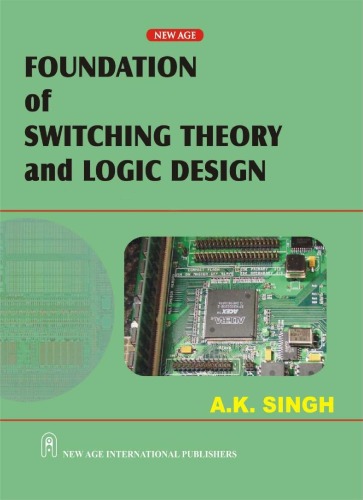

Most ebook files are in PDF format, so you can easily read them using various software such as Foxit Reader or directly on the Google Chrome browser.
Some ebook files are released by publishers in other formats such as .awz, .mobi, .epub, .fb2, etc. You may need to install specific software to read these formats on mobile/PC, such as Calibre.
Please read the tutorial at this link. https://ebooknice.com/page/post?id=faq
We offer FREE conversion to the popular formats you request; however, this may take some time. Therefore, right after payment, please email us, and we will try to provide the service as quickly as possible.
For some exceptional file formats or broken links (if any), please refrain from opening any disputes. Instead, email us first, and we will try to assist within a maximum of 6 hours.
EbookNice Team

Status:
Available4.8
39 reviews
ISBN-10 : 8122422136
ISBN-13 : 9788122422139
Author: Arun Kumar Singh
Fulfills the course requirement on the subject of Switching Theory and Logic Design for B Tech degree course in Electronics Engineering of Jawaharlal Nehru Technological University, Hyderabad and other Technical Universities of India. This title can also serve as a useful reference book for competitive examinations.
CHAPTER 1: NUMBER SYSTEMS AND CODES
1.0 Introduction
1.1 A Review of the Decimal System
1.2 Binary Numbering System
1.2.1 Binary to Decimal Conversion
1.2.2 Decimal to Binary Conversion
1.2.3 Binary Formats
1.2.4 Data Organization
1.3 Octal Numbering System
1.3.1 Octal to Decimal, Decimal to Octal Conversion
1.3.2 Octal to Binary, Binary to Octal Conversion
1.4 Hexadecimal Numbering System
1.4.1 Hex to Decimal, Decimal to Hex Conversion
1.4.2 Hex to Binary, Binary to Hex Conversion
1.4.3 Hex to Octal, Octal to Hex Conversion
1.5 Range of Number Represenation
1.6 Binary Arithmatic
1.7 Negative Number & Their Arithmatic
1.7.1 1's & 2's Complement
1.7.2 Subtraction Using 1's & 2's Complement
1.7.3 Signed Binary Representation
1.7.4 Arithmatic Overflow
1.7.5 9's & 10's Complement
1.7.6 r's Complement and (r - 1)' * s Complement
1.7.7 Rules for Subtraction using (r - 1) ^ r * s Complement
1.7.8 Rules for Subtraction using r's Complement
1.8 Binary Coded Decimal (BCD) & Its Arithmatic
CHAPTER 2: DIGITAL DESIGN FUNDAMENTALS-BOOLEAN ALGEBRA & LOGIC GATES
2.0 Introductory Concepts of Digital Design
2.1 Truth Table
2.2 Axiomatic Systems and Boolean Algebra
2.2.1 Huntington's Postulate
2.2.2 Basic Theorems and Properties of Boolean Algebra
2.3 Boolean Functions
2.3.1 Transformation of a Boolean Functions into Logic Diagram
2.3.2 Complement of a Function
2.4 Representation of a Boolean Function
2.4.1 Minterm and Maxterm Realization
2.4.2 Standard Forms
2.4.3 Conversion between Standard Forms
2.5 Logic Gates
2.5.1 Positive and Negative Logic Designation
2.5.2 Gate Definition
2.5.3 The AND Gate
2.5.4 The OR Gate
2.5.5 The Inverter and Buffer
2.5.6 Other Gates and Their Functions
2.5.7 Universal Gates
2.5.8 The Exclusive OR (Ex-OR) Gate
2.5.9 The Exclusive NOR (Ex-NOR) Gate
2.5.10 Extension to Multiple Inputs in Logic Gates
CHAPTER 3: BOOLEAN FUNCTION MINIMIZATION TECHNIQUES
3.0 Introduction
3.1 Minimization using Postulates & Theorems of Boolean Algebra
3.2 Minimization using Karnaugh Map (K-Map) Method
3.2.1 Two and Three Variable K-Map
3.2.2 Boolean Expresion Minimization Using K-Map
3.2.3 Minimization in Products of Sums Form
3.2.4 Four Variable K-Map
3.2.5 Prime and Essential Implicants
3.2.6 Don't Care Map Entries
3.2.7 Five Varibale K-Map
3.2.8 Six Varibule K-Map
3.2.9 Multi Output Minimization
3.3 Minimization Using Quine-MeCluskey (Tabular) Method
3.4 Exercise
CHAPTER 4: COMBINATIONAL LOGIC
4.0 Introduction
4.1 Arithmatic Circuits
4.1.1 Adders
4.1.2. Subtractors
4.1.3 Code Converters
4.1.4 Purity Generators and Checkers
4.2 MSI and LSI Circuitse
4.2.1 The Digital Multiplexes
4.2.2 Decoders (DeMultiplexera)
4.2.3 Encoders
4.2.4 Serial and Parallel Adders
4.2.5 Decimal Adder
4.2.6 Magnitude Comparator
logic model and theory of change
logic and switching theory
logic design and switching theory
foundation theory of change
foundational theories of decision making
Tags: Foundation, Switching Theory, Logic Design, Arun Kumar Singh